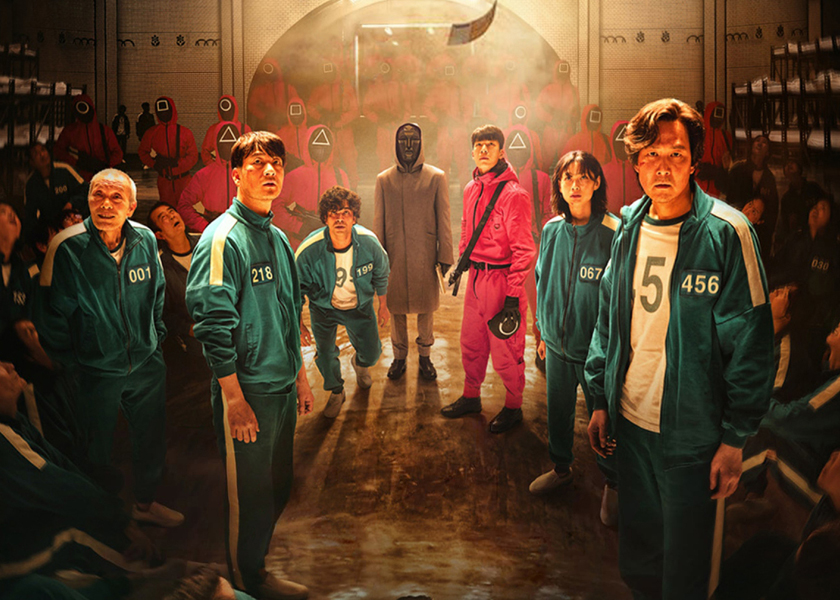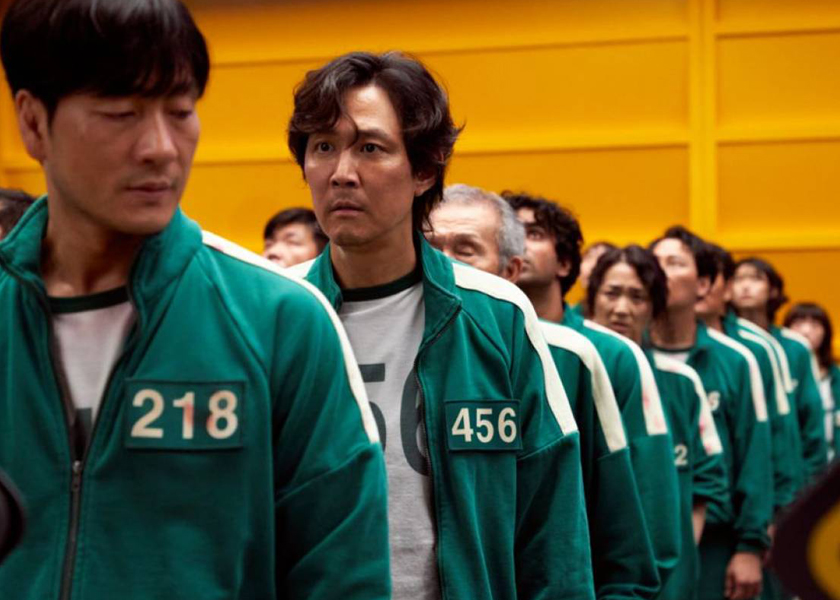After Squid Game, can Korea stay on top of the streaming series world? | By Tom McCarthy (Fall 2021 issue)

Korea has had a hell of a year. Sure, they bungled their vaccine rollout. Yes, the housing bubble is growing weekly. And true, there seems to be a revolving door of political scandals. But in entertainment, Korea is the undisputed king of 2021.
Whatever your opinions about them (I certainly have mine), the K-pop group BTS has put its mark on the music industry in America. To be fair, it has been a gradual Korean Wave of music, 15 years in the making, from Rain selling out Madison Square Garden to Girls’ Generation appearing on The David Letterman Show.
When it come to film and television though, the Korean Wave crashed over western entertainment in just a couple of years. Starting with Parasite in 2019, the world outside Korea began to get glimpses into the complexities of Korean society. Now with Squid Game as the most-watched series in Netflix’s history, this clever and complex series continues to expand Korea’s impact on televisual art and the reach of its increasingly sophisticated social commentary.
Analysis from Korean and international press has been coming hard and fast. Editors of Korean newspapers are eager to point out the political and social appraisals imbedded in this series. The most obvious critique of Korean society is the game itself, in which elites are watching the masses from their ivory towers, relishing the suffering of the plebeians below; the poor fight to survive as the lords fill their coffers.
Going deeper, the incorporation of children’s games in the life-or-death contests is a pointed critique of the way Korea approaches life. Seoul National University Prof. Seong-kon Kim, in the Korea Herald, points out that the lethal integration of adolescent games “impl[ies] that life and death competition begins as early as our childhood.”
This is arguably truer in Korea than in the west. For example, in Korea, most middle-class children celebrate their fifth birthday with a cake followed by a tour of after-school academies they will attend for three to six hours every day until university. This imposition of an all-day academic structure on such young children seems like a sort of trial run for the competitiveness of college and the long, tedious workdays of adulthood.

The show’s creator, Dong-hyuk Hwang, started writing the show 10 years ago in the wake of the 2009 SsangYong Motors mass layoffs. It was a decade before the Korean studios (including Netflix Korea) were ready to hear what he had to say. Perhaps the same could be said for Korean society.
Within the last 10 years, there has been much more cutting commentary in Korea about how difficult it has become to build a life from the ground up. Millennials satirically refer to Korea as “Hell Joseon” in reference to their inability to climb up the proscribed social and career ladder. Seemingly endless workdays for low salaries are creating a generation of young Koreans who never expect to buy an apartment, at least not unless the current housing bubble bursts.
An acquaintance who works at (a chaebol subsidiary) Lotte Construction explained that in the Korean corporate world, your career trajectory is often determined in your first five years or so; you’re either management material or you get lateral promotions with structured pay raises until they encourage you to take an early retirement package. The corporate employee’s life under these conditions is indeed a dreary prospect.
Meanwhile, the heiress of the Korean Air conglomerate was socially quarantined after abusing and then firing a flight attendant; she then quietly returned to her former board positions, still a multi-millionaire. The Samsung heirs had a protracted standoff with the government over how many billions of dollars they should pay in inheritance tax. Fortunately, they are all still billionaires in the end.
Meanwhile, both companies are among the sacred chaebols (the Korean oligarchy of business conglomerate owners) that opposed minimum wage hikes. This opposition led to the companies holding the line on a record-high average starting salary of $29,700 per year ($14.28 per hour) for university-educated white-collar workers in major corporations. This amount is shockingly paltry for any starting executive in the U.S., and it is well below a decent living wage in Korea.
Many of these low-paid executives historically avoid taking their full vacation allotment during their first few years of employment, in fear of appearing less dedicated than their colleagues.
After a build-up of these and other injustices and social and moral injuries to ordinary Koreans, finally, it seemed that Korea was more than ready for producer/director Hwang’s message.
The world was also perhaps, not ready to hear what Korea had to say until now. Squid Game has caught our attention. Millions of non-Koreans within the reach of Netflix are definitely listening and watching, but what does this mean for the future of Korean entertainment?

As the fervor over the show grows, so do the criticisms, many of which are directed at certain quirks unique to (or at least overused in) Korean television. Korean shows commonly short-cut exposition by having characters monologuing their thoughts to themselves, which is unusual in western productions.
Story arcs, even in romantic comedies, tend to rely not just on “will they, won’t they” but on a David-and-Goliath dynamic between the underdog protagonist and some monolithic adversary in the form of the wealthy suitor’s family, corporate warfare, or an improbable social scenario. Cute sound effects supplement characters’ reactions in an effort to eliminate any misinterpretation by the audience. Even in serious dramas like the acclaimed My Mister, cartoonish graphics are commonly utilized to spoon-feed viewers with background information.
Netflix deviated from Korea’s typical production method by wrapping the entire series before releasing it. Dal-yong Jin, a professor at Simon Fraser University, explained to Elle Magazine that televised dramas usually release episodes while simultaneously filming the remaining ones. He noted that shows often alter the original story arcs, depending on ratings and fan response online. This occasionally results in an abnormal number of “Chekov’s gun” scenarios, whereby seemingly pertinent details or questions from earlier episodes remain unresolved, and get cast by the wayside, deemed surplus to the satiation of viewers’ enjoyment.
Squid Game has also been criticized for the corny dialogue of the foreign VIP characters. One of the actors, Daniel C. Kennedy, explained that the script and director called for what he described as “cheesy, callous man-children” who rely on middle-school innuendos for their repertoire of jokes. He revealed that he argued with the writing staff over his lines. He said he felt that, while (and because) he delivered what the director asked for, the criticisms of his character were fair but misinformed; the criticism should be directed toward the writers, not the foreign actors. Interestingly, much of the negativity came from western reviews, while Koreans seemed to overlook the quirkiness which is typical in the portrayal of westerners.
Since Squid Game is most global viewers’ first exposure to some of these peculiarities, there is a certain novelty, but can this kind of writing and directing survive in the global market? A quick search for “Netflix’s 10 best foreign series” generates lists replete with western European or Latin or South American titles, whose story arcs, line delivery, and cinematic style resemble a standard American production.
This is, no doubt, due to a common derivation; there has been more than a century of filmmaking and the trans-Atlantic cross-pollination of technical possibilities and talent (both in front of the camera and behind it). This mixology began back when Orson Welles did a stint in post-war Europe and when iconic Swedish actress Ingrid Bergman became a star in Hollywood. Since 2010, seven of the Oscar winners for “Best Actor” were European.
In Korean cinema, on the other hand, it was only relatively recently that film and television was used both to entertain and to promulgate a particular critical perspective. Korea has escaped the restrictions of producing mere entertainment or government-sanctioned propaganda and has been able to delve deeper into the social consciousness of the era.
Stray Bullet, released in 1960 and considered to be Korea’s greatest film, was originally banned by the Korean government for its unrelentingly bleak depiction of life in post-war Korea. Such censorship lasted until 1988; it was only after the Olympics attracted heavy international scrutiny that Korea relaxed its regulations on the film industry. This disconnect from western cinematic trends allowed Korea to develop its own style; that style still influences many aspects of Korean production.
A larger debate has erupted over the quality of the subtitles and dubbing into foreign languages. This issue was first brought to the forefront after Parasite dominated entertainment news in the west. The film was translated by American film critic/Korean university lecturer and Korean speaker Darcy Paquet, a leading expert in Korean cinema who is highly regarded in the industry for his efforts to promote Korean cinema.
Amidst the overwhelming coverage about Parasite director Joon-ho Bong’s visual style and writing, there was also interest in Paquet’s work in subtitling the film. One notable anecdote revolved around the now-famous “ram-don” dish, a combination of top-grade beef and two different styles of instant noodles.
In Korean, the two noodle packs are called jjapaghetti and neoguri. Long before the film, jjapa-guri was the nickname for a cheap and popular noodle meal which is a word portmanteau using two sets of syllables from each name. However, Paquet chose to create his own portmanteau: ram-don, a combination of ramen and udon, reflecting the two (Japanese) styles of noodles that are more familiar to Western audiences.
The producers accepted his choice and rationale, which, they reasoned, would reduce confusion in audiences less familiar with Korean products, and let non-Korean audiences in on the socio-economic commentary behind the dish. Paquet’s anecdote highlighted how translation can be complex: The cultural implications need to get through to the foreign audience, even if a made-up word is the solution.
Squid Game is now being dissected under a microscope. International audiences are left to guess the purpose of a line or impact of a phrase within the context of the scene. Prominent media critics have noted issues ranging from inadequate or sloppy translations to the inability of English to capture the levels of formality in the Korean language and what it means when one does not abide by the unwritten conversational language rules.
Other complaints have been directed at the level of socio-cultural understanding needed by the audience to grasp the meaning of a comment or situation. One such scene from the series is when a highly-educated Korean participant, Sang-woo, asks an immigrant laborer, Ali, to call him hyung (literally “big brother”) a term of both affection and respect used by younger men or close male friends to address their elder male family member or friend. That this upper-class Korean man would invite the foreign laborer into the close friendship the word hyung implies is a critique of the social/racial divisions and rigidity of Korean society.
This social intermingling of two participants of starkly different backgrounds contrasts with the sterile isolation of the VIPs. Climb the ladder as high as you can, Hwang seems to be saying, but you will never reach the clouds. The game participants begin to realize their predicament as pawns in a terrible game, forming bonds and communicating in ways that violate the rigid social hierarchy that is painfully familiar to average Koreans.
All of this nuance and significance is lost when the subtitles simply read, “Call me Sang-woo” when the character is really saying something more like “I want us to be brothers.”
As Korean pop culture becomes more prevalent in the global zeitgeist, Korean production companies have three options: Opting for cost-effective translations while compromising cultural nuance; generating more accurate translations which take time and care, and can delay release of a translated film or series when interest is at its peak; or reducing a production’s culturally-reliant situations.
While the last option seems least likely, any solution risks reducing the popularity of Korean media. Global audiences may need to educate themselves on Korean culture and tradition, or simply take the entertainment at face value but miss out on the social commentary behind a true opus.
Because the driving force behind the economic success of South Korea (the so-called “Miracle on the Han River”) was (and still is) a cadre of family conglomerates, Korean artists, writers and social critics are in a unique position to comment on the dynamics of economic growth versus social class and tradition. Compounded by the influence of Confucian values on the social hierarchy, South Korea’s rapid development and its rigid social structure are in a unique struggle. It is a conflation of centuries-old tradition forcefully integrated with cutthroat new-world business.
This struggle of the old order and the new has left countless casualties in its wake. Among them are working class people who are unable to keep up, recent graduates who never stood a chance, and middle-class middle-managers living out their own treadmill existence.
Korea has so much to say about how a society could or should develop. Ironically, the expansion of this message beyond the peninsula may cause this sharp commentary to lose its edge. It could become victim to inadequate translation, or watered down to broaden the appeal while compromising the social relevance of the message.
Korean entertainment is reaching a crossroads: It could push for global dominance at the expense of its very ethos, or it could deliver as it always has, and hope the world will appreciate it. At the beginning of the year, Netflix announced it would spend $500 million on Korean productions, with a view to continue its investment well into the future.
This seems like a wise investment, both financially and culturally, but is it enough to keep Korea on top? Only time will tell, but for Korean writers, directors, producers, and actors, it’s game on.


